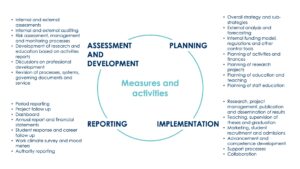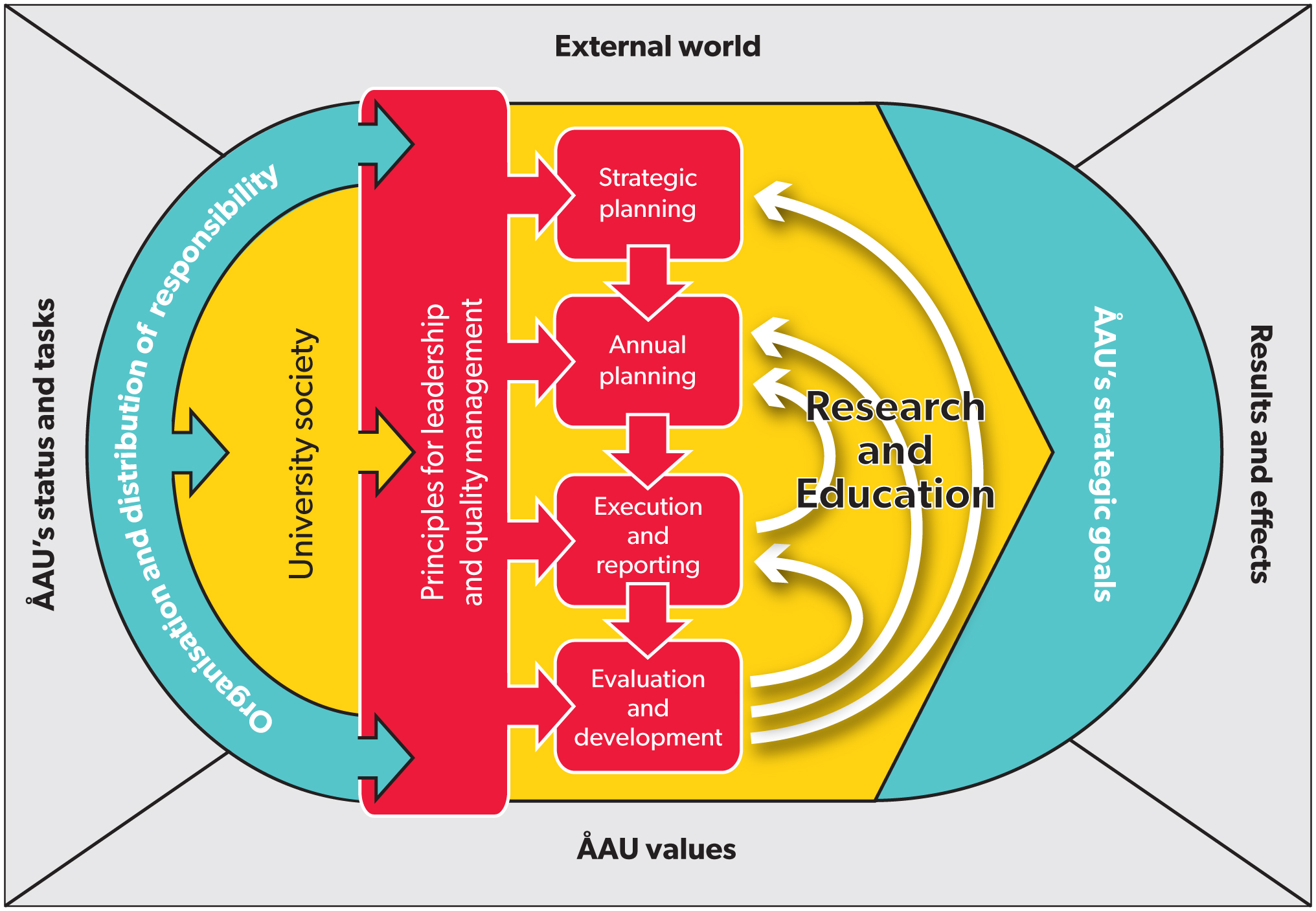The management and quality assurance system at Åbo Akademi University (approved by the University Board 13.8.2015, revised 2.2.2022) describes how the university ensures that it performs its statutory task and achieves its strategic objectives. Below follows a summary of the key points in the management and quality assurance system.
Åbo Akademi University’s quality policy
Development and management of quality is an integral part of the management and development of Åbo Akademi University as a whole. Åbo Akademi University’s management and quality assurance system aims to ensure a well-functioning and continuous development of the activities through
- common principles, structures, processes and timetables
- quality assessment and development at all stages of the activities
- support for developing a common quality culture based on the university values, qualitative operations, a process-oriented approach, sustainable working methods and active interaction.
The university community is formed by all the people who act within the university. A positive approach from the university community and efforts for enhancing the quality of the activities are crucial for achieving an effective quality culture.
Quality management system model
Organisation and delegation of responsibilities are defined in the ÅAU regulations, system and principle documents, rules of procedure, and decisions on work assignments and delegation.
The management model consists of four components that are strongly integrated into each other:
- a common direction and goal that substantiates Åbo Akademi University’s mission, vision, values and strategy
- a transparent and comprehensive management system with management structures, actors, common management processes, documentation, and support tools
- a professional, ethical and collegial leadership executed by ambitious leaders
- an involving management culture that includes the entire university.
Quality system principles
Quality management at Åbo Akademi University is based on five principles, which must always be present in a process to guarantee quality. The quality principles are
- a systematic planning structure, so that a broad participation is guaranteed and the goals are tied to available resources and concretised into practical activities
- identified roles of responsibility for each part and entity of a process, project, or assignment so that all participants know their responsibility and take individual responsibility
- a dynamic implementation with readiness to make changes in ongoing work and channels for support in the work
- follow-up and evaluation, including analysis and methods for disseminating and implementing experiences and discoveries into the activities
- forum for dialogues on development and staff development, so that an open and constructive dialogue is included in all development, and documentation is part of the communication.
Quality system implementation
The management and quality assurance system is realised through four elements that are integrated into the core activities and the support services:
- Strategic planning involves all levels of management and broad processes in the university community. The common regulations, the internal funding model and other control tools are adapted to realise the strategy.
- The annual planning includes yearly plans for activities and financing based on the strategy. The process includes analysis of last year and the future, concretisation of objectives and measures for yearly activities as well as financial frameworks and resource planning.
- Everyone in the university community has their own responsibility for implementing plans and activities based on the strategy. Results are reported, followed up and analysed with a focus on progress and needs for development.
- In addition to external assessments (e.g., The Finnish Education Evaluation Centre (FINEEC), the University Board and Rector can initiate internal assessments of research, education and administration.
Long-term objectives are set based on a systematic analysis of activities, resources and development needs. The objectives are operationalised through concrete measures and activities, which are allocated resources annually and followed up.

Quality system assessment and development
The University Board is responsible for developing the model and the system is evaluated by each new Board, if needed. The Rector is responsible for that the system is being used and followed up at a university-wide level.
Everyone is responsible for the quality in matters in which they have a decision-making role. Everyone in the university community is responsible for implementing the management and quality assurance system in their daily work, and for coming up with ideas for further development of the system.
